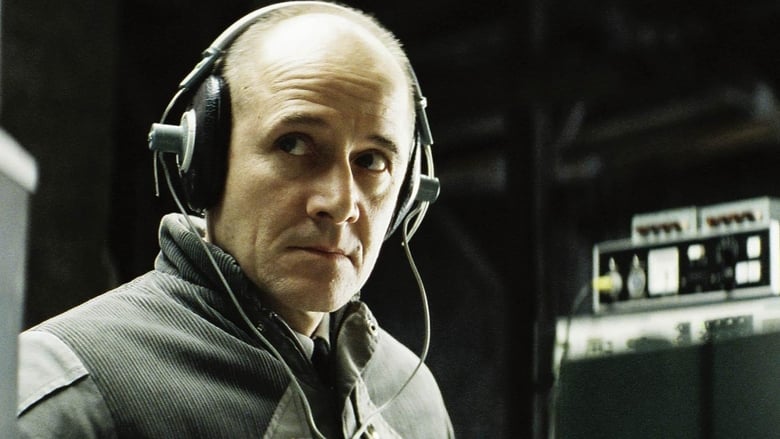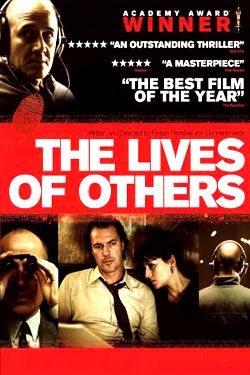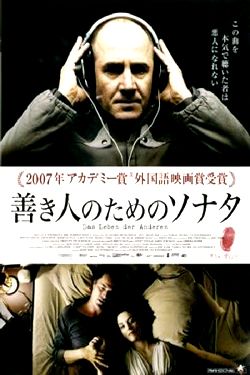← Back to Reviews

in

|

|
Year of release
2006
Directed by
Florian Henckel von Donnersmarck
Written by
Florian Henckel von Donnersmarck
Starring
Ulrich Mühe
Sebastian Koch
Martina Gedeck
Ulrich Tukur
Thomas Thieme
The Lives of Others
2006
Directed by
Florian Henckel von Donnersmarck
Written by
Florian Henckel von Donnersmarck
Starring
Ulrich Mühe
Sebastian Koch
Martina Gedeck
Ulrich Tukur
Thomas Thieme
The Lives of Others
Plot – East Berlin, 1984. A Stasi agent is given the assignment of surveying a noted playwright and his actress lover. The agent, Hauptmann Gerd Wiesler (Ulrich Mühe), is a staunch believer of the system for which he works and attempts to uphold. The playwright is Georg Dreyman (Koch), a respected writer who conceals his contempt for the fascist regime to such an extent that he is actually held in high esteem by the bureaucrats he loathes. When a minister who is making advances towards his lover (Gedeck) chooses to abuse his power however, Dreyman is put under surveillance. And with the stern, stoic Wiesler on the case things don't look good for him. As time goes on however Wiesler finds himself becoming increasingly absorbed in their lives, so much so that it begins to change his way of thinking about what he is doing.
For nearly six whole years I have hated this film. I'll admit though that it was a fairly irrational hatred when you take into account the fact I had never actually seen the film until just a few days ago. So what then was the reason for my hatred? Well I'll give you a clue; the hatred started on February 25th, 2007. The hatred came about because on that date, this film robbed Pan's Labyrinth of the Best Foreign Language Film Oscar at the 79th Academy Awards. I was fuming! How could some little grey-looking German film about a guy listening to the lives of other people possibly be better than the magical experience that was Del Toro's masterpiece of fantasy cinema? It was one of the great mistakes in the history of the Academy (bearing in mind again that I had not seen The Lives of Others at this point)! Well now that I've seen it I no longer hold that hatred. I personally still think that Pan's Labyrinth should have come out on top, but I no longer believe it to be the great injustice I once did. That's because this also happens to be a fantastic film; a film so much more fascinating and gripping than I could possibly imagined from its premise.
For me personally I was able to get a lot out of the film purely as a history lesson. I knew about the notion of the Stazi and the type of tactics they employed, but I didn't really know about the huge scale of it. At the beginning of the film we are told that at its height the Ministry for State Security had 100,00 employees, and had recruited some 200,000 informants (most by pretty dodgy practices). Those numbers are just ridiculous! It's like an operation whose scale in terms of those involved is like that of a small country. And some of the things they did?! Just unbelievable. I'm always astonished at how things like this were allowed to happen, particularly in a time that isn't exactly a million years ago. How could something like this happen in a country like Germany less than 30 years ago? Speaking of years, surely it's no mere coincidence that the film takes place in the year of 1984. A little reference to George Orwell's classic dystopian novel perhaps?
Against this large expanse of politics the main narrative thread is a much smaller and more personal tale, occupied by a series of complex and deeply flawed individuals. Characters that are brave, but also selfish. Characters that make sacrifices for others but also sell them out to aid their own interests. Boiled down to its most basic attributes they are characters that do both good, and bad. So basically they are just great examples of truly 'human' characters. None more so than Wiesler. At the beginning of the film he is a pretty pathetic individual. He has nothing in his life that makes him passionate, and no one who seems to care for him. The only form of human contact he can get is with a prostitute, and when he does so he pitifully pleads for her to spend time with him. This only seems to come into sharp focus for him when he contrasts it against the lives of the passionate couple he is eavesdropping on. Their lives; so full of passion, pain and joy, just highlight how lonely and sad his existence truly is. He just becomes seduced by the sheer amount of emotion in their lives as he lives vicariously through him. For about the first half hour I just hated him, but then you start to see that he is actually a man of honour, someone who believes what he is doing is right, who just happens to have held a different opinion. And then as he becomes disenchanted with that way of life I found myself cheering on every little small gesture he made. And I think it's wonderful how these characters are so bound together; how they have such an impact on the lives of each other and yet they barely share a scene together, or exchange a single word.
Given what I knew about this film beforehand, I came into it expecting an intellectual, possibly stuffy film set in that tremendously grey world that was communist Germany. So imagine my amazement when I discovered a film that is surprisingly beautiful. This beauty came about both as a result of the journey that the characters embark on, and the sheer craft that was put in to creating this wonderful film. And yes the film does have a very grubby, grey aesthetic so it's perhaps not the nicest film to look at, but it does feel an ideal reflection of communist Berlin and the oppressive mood of the times. Along with a number of other little touches; such as camera work that seemed to have quite a noirish disposition, it helps to create a perfect atmosphere of fear and doubt as individuals attempt to exist under a suffocating, totalitarian regime.
I love how the film portrays the power and beauty of art. As well as showing art's power as a weapon of protest against authority, it shows how the beauty of art is able to give strength to people and how it's able to change the character of Weisler. As well as experiencing the sensation of emotions that fill the lives of Dreyman and Christa-Maria, what really affects him are the artistic exploits they dabble in. It's the words of the books they read, and the notes of the music they play that really begin to tug on his heartstrings and awaken feelings within him. The scene were Dreyman sits at the piano playing a piece of Beethoven music is a beautiful moment, and with Wiesler listening in his eyes begin to tear up a little. And I love how the evolution Wiesler's character undertakes is depicted. There's no huge revelation, no big denouncement where he confides in someone about his change of heart. It is shown purely through a series of small gestures and decisions; the omittance of facts which would crucify Dreyman; his decision not to report a young boy's father as a dissident; the uplifting scene where he talks to Christa-Maria and tells her how much he admires her, giving her the strength to break off a relationship with the minister that she felt trapped in.
For nearly six whole years I have hated this film. I'll admit though that it was a fairly irrational hatred when you take into account the fact I had never actually seen the film until just a few days ago. So what then was the reason for my hatred? Well I'll give you a clue; the hatred started on February 25th, 2007. The hatred came about because on that date, this film robbed Pan's Labyrinth of the Best Foreign Language Film Oscar at the 79th Academy Awards. I was fuming! How could some little grey-looking German film about a guy listening to the lives of other people possibly be better than the magical experience that was Del Toro's masterpiece of fantasy cinema? It was one of the great mistakes in the history of the Academy (bearing in mind again that I had not seen The Lives of Others at this point)! Well now that I've seen it I no longer hold that hatred. I personally still think that Pan's Labyrinth should have come out on top, but I no longer believe it to be the great injustice I once did. That's because this also happens to be a fantastic film; a film so much more fascinating and gripping than I could possibly imagined from its premise.
For me personally I was able to get a lot out of the film purely as a history lesson. I knew about the notion of the Stazi and the type of tactics they employed, but I didn't really know about the huge scale of it. At the beginning of the film we are told that at its height the Ministry for State Security had 100,00 employees, and had recruited some 200,000 informants (most by pretty dodgy practices). Those numbers are just ridiculous! It's like an operation whose scale in terms of those involved is like that of a small country. And some of the things they did?! Just unbelievable. I'm always astonished at how things like this were allowed to happen, particularly in a time that isn't exactly a million years ago. How could something like this happen in a country like Germany less than 30 years ago? Speaking of years, surely it's no mere coincidence that the film takes place in the year of 1984. A little reference to George Orwell's classic dystopian novel perhaps?
Film trivia - All of the listening and recording props that feature in the film are actual examples of Stasi equipment on loan from museums and collectors. The props master had himself spent two years in a Stasi prison, and insisted upon absolute authenticity right down to the machine Wiesler uses at the end of the film to steam-open up to 600 letters per hour.
Given what I knew about this film beforehand, I came into it expecting an intellectual, possibly stuffy film set in that tremendously grey world that was communist Germany. So imagine my amazement when I discovered a film that is surprisingly beautiful. This beauty came about both as a result of the journey that the characters embark on, and the sheer craft that was put in to creating this wonderful film. And yes the film does have a very grubby, grey aesthetic so it's perhaps not the nicest film to look at, but it does feel an ideal reflection of communist Berlin and the oppressive mood of the times. Along with a number of other little touches; such as camera work that seemed to have quite a noirish disposition, it helps to create a perfect atmosphere of fear and doubt as individuals attempt to exist under a suffocating, totalitarian regime.
I love how the film portrays the power and beauty of art. As well as showing art's power as a weapon of protest against authority, it shows how the beauty of art is able to give strength to people and how it's able to change the character of Weisler. As well as experiencing the sensation of emotions that fill the lives of Dreyman and Christa-Maria, what really affects him are the artistic exploits they dabble in. It's the words of the books they read, and the notes of the music they play that really begin to tug on his heartstrings and awaken feelings within him. The scene were Dreyman sits at the piano playing a piece of Beethoven music is a beautiful moment, and with Wiesler listening in his eyes begin to tear up a little. And I love how the evolution Wiesler's character undertakes is depicted. There's no huge revelation, no big denouncement where he confides in someone about his change of heart. It is shown purely through a series of small gestures and decisions; the omittance of facts which would crucify Dreyman; his decision not to report a young boy's father as a dissident; the uplifting scene where he talks to Christa-Maria and tells her how much he admires her, giving her the strength to break off a relationship with the minister that she felt trapped in.
Film trivia - Ulrich Mühe and Florian Henckel von Donnersmarck were both successfully sued for libel by Mühe's ex-wife following an interview Mühe gave in which he claimed his second wife, actress Jenny Gröllmann, informed on him during their marriage while they were East German citizens. Gröllmann denied the claims, although 254 pages worth of government records detailed her activities. However, Jenny Gröllmann's real-life controller later claimed he had made up many of the details in the file and that the actress had been unaware that she was speaking to a Stasi agent.
The performances certainly live up to the rest of the film. As the initially cold and stern Wiesler, Mühe gives a powerful, yet understated performance. Sitting alone in the empty apartment above Dreyman or hiding in the shadows for much of the running time he doesn't have much interaction with other characters or the chance to express himself vocally. Therefore much of his work must come through facial expressions, but even then he does so in a very restrained fashion. He has no need for histrionics or large gestures; he is just able to reveal the growing humanity beneath Wiesler's façade, and gain our favour with a seemingly simple performance which in reality is deceptively skilled. He tells so much of the story merely in his eyes.
After watching the film I came online just to check out some info on it and discovered that this was Florian Henckel von Donnersmarck's directorial debut. I find that just astonishing. How could someone create such an accomplished work right off the bat? And not only did he direct the film, he also wrote it! That's not fair; no one should be this good right away! Surely The Lives of Others should join the likes of Citizen Kane (Welles), 12 Angry Men (Lumet) and Reservoir Dogs (Tarantino), and be considered as one of the all time great directorial debuts.
Conclusion – A stunning accomplishment, especially from a first time director. With a sharp and layered script, strong direction and a series of impressive performances it is an elegant piece of film-making which is a beautiful and resonant piece of work.
After watching the film I came online just to check out some info on it and discovered that this was Florian Henckel von Donnersmarck's directorial debut. I find that just astonishing. How could someone create such an accomplished work right off the bat? And not only did he direct the film, he also wrote it! That's not fair; no one should be this good right away! Surely The Lives of Others should join the likes of Citizen Kane (Welles), 12 Angry Men (Lumet) and Reservoir Dogs (Tarantino), and be considered as one of the all time great directorial debuts.
Conclusion – A stunning accomplishment, especially from a first time director. With a sharp and layered script, strong direction and a series of impressive performances it is an elegant piece of film-making which is a beautiful and resonant piece of work.
